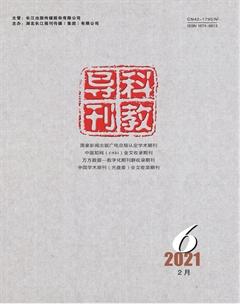新时代小学科学教育的着力点

小学科学教育是学校科学教育的重要组成部分,新中国成立以来先后出台了4个大纲、2个课程标准,不断借鉴发达国家科学教育改革与研究的新成果、新理念、新趋势,如今从容步入新时代。
新时代下,世界科技迅速发展对国家科技人才的创新要求更具挑战性,是培养科技人才的重要基础,这就要求学校高度重视小学科学教学,进一步加强科学教学改革与实践探索,加强实验室建设,加强校内外科学教育融合,加强小学科学教师培养,促进教师的专业发展,全面推进我国小学科学教育的新发展,为建设创新型国家,提高青少年科学素养,提高国家综合竞争力,作出新的努力和新的贡献。
首先,加强对新时代小学科学教育目标和价值的认识。2017年的《义务教育小学科学课程标准》明确提出,小学科学课程的总目标是培养学生的科学素养,包括科学知识、科学探究、科学态度,以及科学、技术、社会与环境的关系等。小学科学教育在培养学生对自然的好奇心、求知欲,形成对科学的探究兴趣,获得科学知识,学习科学方法,领悟科学思想,培养科学精神、创新精神与实践能力等方面具有重要价值。各级教育部门要切实把科学课与语文课、数学课放在同等重要的地位加以重视与实施。
其次,加强新时代的小学科学教学改革实践及研究。小学科学教学要围绕科学核心概念,利用学习进阶的思想,开展探究式教学,培养学生的科学思维,发展学生的科学探究能力;要积极探索跨学科的STEM学习,重视技术与工程教育,从科学教育转换到科技教育,培养学生的STEM素养;要积极探索多样化的科学教学评价方式,加强形成性评价,重视表现性评价,全面评价学生的科学素养;要积极探索基于信息技术的科学教学,创设丰富的教学情境,实现科学学习情境的互动性和探究性,充分发挥信息技术对科学教学的支持作用。
第三,加强新时代小学科学实验室的建设。实验是自然科学的基础,没有实验就没有现代自然科学的产生与发展。小学科学教学要以实验为基础,开展探究式学习,这是科学教学的显著特征。实验室是小学科学教学的重要资源,是科学教学的最重要场所之一,教育部门和学校要加大经费投入,建设数量充足的现代化实验室,包括探究实验室、STEM实验室、创客实验室等,以满足科学教学及科技活动的需要。
第四,加强新时代小学科学教育校内外的融合。学校是实施科学教育的主战场,是学生学习科学知识、体验科学过程、领悟科学思想的基本保障。但是学校的科学教育资源是有限的,丰富的校外资源如科技馆、博物馆、青少年科普实践基地、社区、农场等都是科学学习的重要场所,小学科学教师要根据教学内容,充分利用校外资源,开展科学学习与科技创新活动,拓展学生的知识视野,提高学生的创新精神与科学实践能力。
第五,加强新时代小学科学教师队伍的建设。小学科学教师是推动小学科学课程改革的关键因素之一,小学科学课程改革能否成功,很大程度取决于是否有一支高素质的科学教师队伍。当前,我国小学科学教师队伍的专业化水平不高,兼职科学教师多、非科学教育专业或理科专业背景的科学教师较多的问题依然十分严重。因此,培养大批高素质的专业化科学教育教师队伍,以及开展多层次、多类型的小学科学教师培训,应该成为高等师范院校的使命与责任。与此同时,各级教育主管部门要为小学科学教师定编定岗,配置数量足够的专业化科学教师,确保小学科学教学质量的全面提高。
林长春
重庆师范大学科技教育与传播研究中心主任、教授
中国教育学会科学教育分会副理事长
中国青少年科技辅导员协会科学教师教育专委会主任委员
The Focus of Primary School Science
Education in the New Era
LIN Changchun
中圖分类号:G424 文献标识码:A DOI:10.16400/j.cnki.kjdkx.2021.02.001
LIN Changchun
Director and Professor of Science and Technology Education and Communication Research Center of Chongqing Normal University
Vice President of Science Education Branch of Chinese Society of Education
Chairman of Science Teacher Education Committee of China Youth Science and Technology Counselors Association
Primary school science education is an important part of school science education. Since the founding of the people's Republic of China, four outlines and two curriculum standards have been issued, constantly learning from the new achievements, new ideas and new trends of science education reform and research in developed countries.
In the new era, with the rapid development of science and technology in the world, the innovation requirements of national science and technology talents are more challenging, which is an important basis for training science and technology talents. This requires schools to attach great importance to primary school science teaching, further strengthen the reform and practice of science teaching, strengthen laboratory construction, strengthen the integration of internal and external science education, strengthen the training of primary school science teachers, and promote the professional development of teachers In order to build an innovative country, improve the scientific literacy of young people and enhance the comprehensive competitiveness of the country, we should make new efforts and new contributions.
First of all, we should strengthen the understanding of the goals and values of science education in primary schools in the new era. The "compulsory education primary school science curriculum standard" in 2017 clearly states that the overall goal of primary school science curriculum is to cultivate students' scientific literacy, including scientific knowledge, scientific inquiry, scientific attitude, and the relationship between science, technology, society and environment. Primary school science education is of great value in cultivating students' curiosity and thirst for knowledge about nature, forming their interest in science exploration, acquiring scientific knowledge, learning scientific methods, comprehending scientific ideas, cultivating scientific spirit, innovative spirit and practical ability. Education departments at all levels should attach equal importance to science, Chinese and mathematics.
Secondly, we should strengthen the practice and research of the reform of science teaching in primary schools in the new era. The scientific teaching in primary school should focus on the core concept of science, develop inquiry teaching by using the advanced learning ideas, train students' scientific thinking and develop their scientific inquiry ability; actively explore the step learning of interdisciplinary, attach importance to technology and engineering education, transform from scientific education to scientific and technological education, and cultivate students' stem literacy; actively explore diversified scientific teaching evaluation method, strengthen formative evaluation, pay attention to performance evaluation, comprehensively evaluate students' scientific literacy; we should actively explore the scientific teaching based on information technology, create rich teaching situations, realize the interaction and inquiry of scientific learning situations, and give full play to the support role of information technology for scientific teaching.
Third, strengthen the construction of primary school science laboratory in the new era. Experiment is the basis of natural science. Without experiment, there would be no emergence and development of modern natural science. Primary school science teaching should be based on experiments and carry out inquiry learning, which is a significant feature of science teaching. Laboratory is an important resource of science teaching in primary schools, and it is one of the most important places of science teaching. Education departments and schools should increase funding to build a sufficient number of modern laboratories, including inquiry laboratory, stem laboratory, maker laboratory, etc., in order to meet the needs of science teaching and scientific and technological activities.
Fourth, strengthen the integration of primary school science education in the new era. School is the main battlefield of implementing science education, and it is the basic guarantee for students to learn scientific knowledge, experience scientific process and comprehend scientific thought. However, the resources of science education in schools are limited. Rich resources outside schools, such as science and technology museum, museum, youth science popularization practice base, community, farm and so on, are important places for science learning. Primary school science teachers should make full use of the resources outside schools according to the teaching content, carry out scientific learning and scientific and technological innovation activities, expand students' knowledge horizons, and improve students' innovative spirit and scientific practice ability.
Fifth, strengthen the construction of primary school science teachers in the new era. Primary school science teachers are one of the key factors to promote primary school science curriculum reform. The success of primary school science curriculum reform largely depends on whether there is a high-quality science teacher team. At present, the specialization level of primary school science teachers in China is not high, and the problems of more part-time science teachers and more science teachers with non science education or science background are still very serious. Therefore, to cultivate a large number of high-quality professional science education teachers, as well as to carry out multi-level and multi-type primary school science teacher training, should become the mission and responsibility of normal universities. At the same time, the education authorities at all levels should fix the number of primary school science teachers, allocate enough professional science teachers, and ensure the overall improvement of the quality of primary school science teaching.

